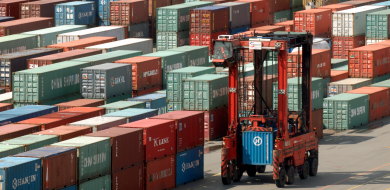Until recently, economic data and sentiment indicators suggested that Germany was weathering well the prevailing headwinds in the world economy, but Thursday’s data added to growing evidence that this may not be the case.
Figures from the economy ministry showed that output from German factories dipped 0.5 percent from February, the first monthly fall since November, while February’s rise was adjusted downwards to mere 0.2 percent.
The main culprit was a 12.3 percent slump in construction activity as a result of a mild winter which meant that the usual spring bounce in building activity was not forthcoming, the ministry said.
On a two-monthly basis – comparing February and March to December and January – production rose a more respectable 0.6 percent, and for the whole of the first quarter output was up 2.3 percent.
Commerzbank economist Matthias Rubisch said the quarterly output number was the best result for more than a year and that as a result he expects the German economy to have grown 0.8 percent in the first three months of 2008.
But the weak end to the quarter is a sign that there are tougher times ahead.
Manufacturing output taken on its own fell 0.2 percent in March, “below the average of the first quarter, and the decline in order intake in recent months suggest only a slight increase in the coming months at best,” Rubisch said.
“In the second quarter a stagnation of GDP (Gross Domestic Product) growth is likely,” he said.
Analysts at Moody’s agreed, saying the data was a sign that demand for German goods is falling, forecasting industrial output growth will slow from 6.9 percent last year to just 3.0 percent this year.
The economy ministry shared the downbeat assessment.
“Falling orders in recent months and the clear worsening of sentiment of late are signals that there will be a somewhat weaker production dynamic in the coming months.”
Exports are the motor of the German economy, but another set of numbers released on Thursday suggested that weaker demand abroad and a stronger euro – which makes eurozone goods less competitive in price – are taking their toll.
Data from the statistics agency showed that German exports fell 0.5 percent in March from February.
Again, for the first quarter as a whole the numbers were respectable, with exports for the first three months up 2.4 percent, which “can hardly be described as weak,” Commerzbank’s Rubisch said.
“Nevertheless, export growth can be expected to slow down over the months ahead as the economy in Western Europe shifts down a gear, and the euro gained in strength recently,” Rubisch said.



 Please whitelist us to continue reading.
Please whitelist us to continue reading.